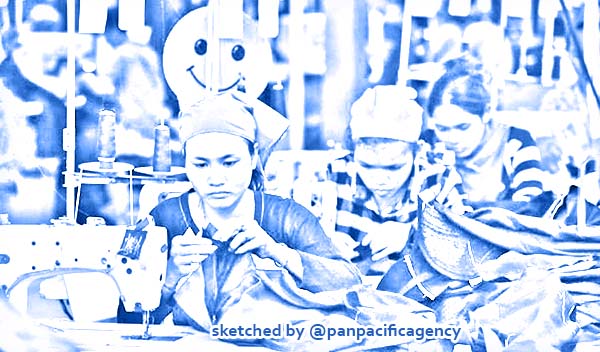Sexual harassment at work costs Cambodia’s garment industry $89 million a year

Cambodian women working at garment factory in Phnom Penh. KT/Chor Sokunthea. Sketched by the Pan Pacific Agency.
PHNOM PENH, Oct 20, 2019, The Khmer Times. Sexual harassment in the workplace could have an indirect cost to the garment industry of up to $89 million per year, said Care Cambodia’s acting country director Jan Noorlander. Speaking at a Business of Women at Work forum yesterday, Mr Noorlander said the organisation was very surprised at the enormous sum, which it put down to women not feeling safe in their jobs and calling in sick or resigning, reducing productivity, reported The Khmer Times.
“It means that the factory has to recruit more staff and it takes time, and these all affect productivity. If you add all of these things together in a very big industry it comes to a very high number,” Mr Noorlander said.
He pointed out that this is not just a Cambodian problem but one found all over the world.
“It is about the power that men have over women and how they abuse that power sometimes. If you focus on the garment sector in Cambodia, the biggest industry sector in the country, and if you add the loss in productivity because of this problem, that adds up to a huge amount of money,” Mr Noorlander added.
“It is not just about the money: It is also the view that everybody should feel safe in the workplace,” he said.
Sara Park, programme manager of a group called Better Factories Cambodia, said many working women experience sexual harassment at some point in their career.
“Culture does not create people, people create culture, and it is true that if the full humanity of women is not part of our culture, then we must make it part of our culture.”
She added that sexual harassment affects work outcomes, reduces job satisfaction and increases absenteeism.
“We know that workers in certain sectors … are especially vulnerable to violence and harassment – and garment workers are very much in this category,” Ms Park said.
“As one of the Cambodian garment workers said about sexual harassment, women will feel scared and their minds will not be at ease. It will really affect the productivity of women workers,” she explained.
“We need a mindset change and action to develop a culture that prevents sexual harassment from occurring. It is not acceptable that women feel scared to report harassment or violence. This issue needs addressing at the workplace and a collaborative effort is required from all sectors of society including the government, workers, and employers to sustain a dialogue on the subject. It also requires the private sector to take responsibility,” she added.
Cambodia’s population is 51 percent female and they are essential resources to boost the economy. The garment sector has boosted national economic growth, providing jobs for women and giving them the opportunity to improve their livelihoods and escape poverty.
Women can be burdened with family issues, suffer domestic violence and some have health issues that need to be cared for so there is a need to prepare a policy in response to these challenges, said Chan Sory, secretary of state at the Ministry of Women’s Affairs.
“Our ministry’s task is to maintain gender equality in Cambodia,” she said. “In Cambodia, as well as the rest of the world, violence comes from inequality between the genders. There is a lack of knowledge of proper behaviour, awareness of discrimination. Also, women’s voices are heard less. These factors put women at risk at work and in public,” she said.
Ms Sory said the participation of the private sector, local and national authorities and society at large is needed to implement appropriate policies.
Minister of Labour and Vocational Training Ith Samheng said the government is working with other countries to eradicate violence and sexual harassment in the workplace.
He added that it is important to promote better working conditions for employees to provide them with dignity and respect.
“Violence and sexual harassment in the workplace has an impact on productivity and the health of workers,” Mr Samheng said.
“Sexual harassment and violence in the workplace occur in different forms. Therefore, to counter it, there is a need for participation from all stakeholders in the network of the global supply chain [of a company], including participation from workers, employers, factory owners, buyers, unions, the government, and the private sector.”
The government has vowed to prevent and eliminate this issue from the working environment and Cambodian society as a whole, he added.
The government has released several policies, implemented national and international regulations, and works with partners, especially Care Cambodia, to promote the safety and health of women workers. It has also issued principles regarding the prevention and abolition of violence and sexual harassment in the workplace.
Mr Samheng said violence and sexual harassment are illnesses that need to be cured. He said all parties must join together to prevent and eradicate the disease, with unions and civilians acting as partners.